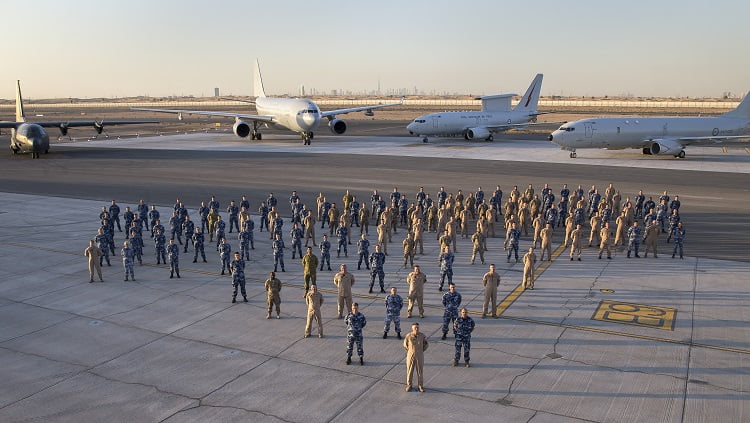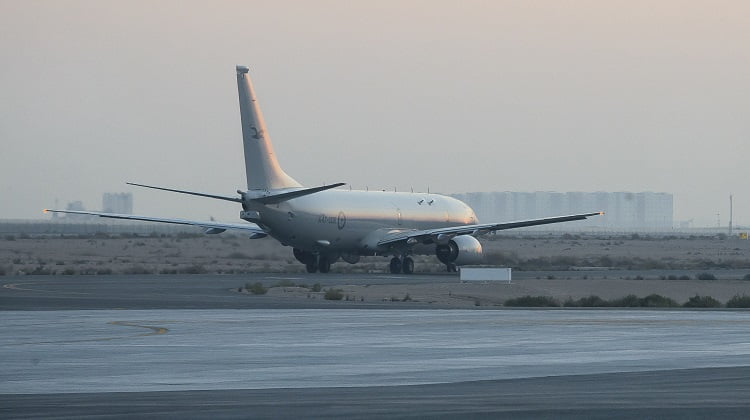By Andrew McLaughlin
The deployment of an RAAF P-8A Poseidon maritime ISR aircraft to the Middle East has concluded.
The aircraft was deployed under the International Maritime Security Construct (IMSC) in September in response to the June shoot-down of a US Navy RQ-4A Global Hawk UAS by Iran, and subsequent Iranian attacks on commercial shipping near the Straits of Hormuz.
“Over the last month, the P-8A Poseidon aircraft has provided valuable maritime surveillance and reconnaissance to support the coalition partners in the IMSC,” Defence Minister Senator Linda Reynolds said in a November 24 statement.
“It is now time for the Poseidon to return home, having played a key role in supporting freedom of navigation and the free flow of shipping, which is crucial to regional security and stability.”
During the deployment, the aircraft completed 12 missions and flew for about 100 hours. Also deployed to Australia’s main operating base at Al Minhad AB in UAE was an E-7A Wedgetail, a C-130J Hercules, a KC-30A, and a visiting C-17A (pictured below).

This article was first published by ADBR on December 4, 2019.
Editor’s Note: Visits to Bahrain this year certainly underscored the Australian presence in supporting Fifth-fleet led operations.
The mission of the IMSC is described as to “assure, deter, and expose malign activity and threats to shipping in order to maintain freedom of navigation, international law, and free flow of commerce to support regional stability and security of the maritime commons.”
According to a story published by Aljazeera on November 7, 2019:
A US-led naval coalition officially launched operations in Bahrain on Thursday to protect shipping in the troubled waters of the Gulf, following a string of attacks that Washington and its allies blamed on Iran.
The coalition, aimed at warding off the perceived threat to the world’s oil supply, has been in the making since June.
Iran, which has denied any responsibility for the mystery attacks, has put forward its own proposals for boosting security that pointedly exclude outside powers.
Bahrain, which hosts the US Navy’s Fifth Fleet, joined the International Maritime Security Construct (IMSC) in August. Saudi Arabia and the United Arab Emirates (UAE) followed suit in September.
Australia and the UK are the main Western countries to have agreed to send warships to escort Gulf shipping. The newest member, Albania, joined on Friday.
See, for example, the following:
NAVAL SUPPORT ACTIVITY BAHRAIN, Bahrain (Nov. 7, 2019) International partners attend the opening of Coalition Task Force (CTF) Sentinel’s new command center at Naval Support Activity, Bahrain.
Participants from Australia, Bahrain, Kingdom of Saudi Arabia, United Arab Emirates, United Kingdom and United States joined together at the ceremony to show their commitment to the international rules-based system.
CTF Sentinel is a multinational maritime effort to promote maritime stability, ensure safe passage, and enhance freedom of navigation throughout key waterways in the Arabian Gulf, Strait of Hormuz, the Bab el-Mandeb Strait and the Gulf of Oman.
(U.S. Navy video by Mass Communication Specialist 3rd Class Christopher O’Grady/Released)
During the recently held BIDEC 19 Conference held in Bahrain, the Fifth Fleet Commander underscored the need for enhance proactive ISR to provide for the ability of the key players allied in the region to deal with threats posed by state and non-state threats to the rules based order in the region.
Certainly, the RAAF’s P-8 contributed to that need.
Also, see the following:
BIDEC 2019: A Window into Bahraini Perspectives on Defense and Security


